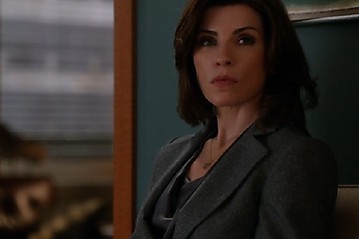The Good Wife Episode 7: In Which I Draw an Analogy to The Hunger Games
The case of the week: a former client sues Lockhart Gardner for malpractice. Alicia, who was involved with the case, agrees to give favorable (and truthful!) testimony if the firm returns the money she invested when she became a partner. Lockhart Gardner then offers a partnership to one of the junior Florrick Agos associates in return for him giving testimony blaming everything on Alicia.
In this episode, the writers doubled down on their decision to make Alicia’s unresolved feelings for Will the reason she forms her own firm. Owen appears to remind us (via reminding Alicia) that Alicia’s stated reason for leaving Lockhart Gardner—she wants to strike out on her own—is a front. Indeed, Owen’s primary purpose in the show has been to tell us things we already know. He functions as a good angel, perching on Alicia’s shoulder from time to time to remind her that her desires are valid. I feel like the writers want us to root for Owen to (finally!) be heard, but I can’t. Here’s why:
A) I’ve never been sold on Alicia and Will as a Great Romance.
B) Seriously, who decides to have a heart to heart with a sibling on one of the busiest days of that sibling’s life in a room surrounded by her co-workers?
C) As I suggested in my recap of episode 5, the Alicia/Will dyanamic had started to feel flat. It’s way more fun to watch Alicia and Will as generals marshaling opposing armies than to watch them dance through one more round of should-we-or-shouldn’t we.
More particularly, the Alicia who blackmails Lockhart Gardner into refunding her partnership contribution is far more interesting to watch than the Alicia who spent half her time pensively avoiding Will.
Notice that I say “interesting,” not “likeable.” For four seasons, Alicia has performed a sympathetic public persona—not one entirely of her own choosing, but one she nonetheless has worked to maintain (see, for example, the interview the gives to win Peter the D.A. election in “Foreign Affairs”). The writers have, as I’ve argued previously, detailed the widening gap between this persona and Alicia the individual. “The Next Week,” however, gives the impression that the gap has also been making the writers nervous.
As Laura writes here, the past fifteen years have produced a bumper crop of male TV protagonists who drew viewers despite their absence of likeability. Walter White and Don Draper fascinate not because they are principled or kind, but because they are fabulous monsters. By contrast, morally compromised female characters rarely generate the same fascination—in part, as Laura points out, because they don’t tend to have as much agency. There are some exceptions to this rule (e.g. Roslin and Starbuck on Battlestar Gallactica), but they remain exceptions. By making Alicia’s fear of her attraction to Will motivate her split from Lockhart Gardner, The Good Wife’s writers shoehorn her into a conventionally feminine mold. She leaves the firm because she her emotions overwhelm her, not because she wants, in Eli’s words, to “make something of herself.”
In the first Hunger Games book (yes, this is a leap, but bear with me), Katniss, having forced the Capitol to declare both her and Peeta winners by attempting double suicide, finds herself in trouble. The Capitol correctly perceives the attempted suicide as an act of political rebellion; Katniss, by choosing to die rather than kill, has undermined the Games’ performance of subjugation via collaboration. In order to save her life, Katniss tells the nation that she acted out of love for Peeta. She reframes her choice as emotional, conventionally “female,” and therefore as private rather than political.
By making Alicia’s passion for Will her motivation for starting her own firm, The Good Wife’s writers, like Katniss, frame a key decision as driven by emotion in order to portray the individual making that decision as lacking in agency. Unlike Katniss, the writers seem unaware of this move’s ideological resonances. Portraying Alicia as at the mercy of her emotions, they make her passive, and therefore less threatening to viewers who find frightening the prospect of an ambitious female protagonist. In the process, they are fumbling their opportunity to make Alicia—and the universe she inhabits—more compelling.








